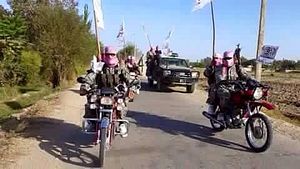A government offensive launched to retake the northern provincial capital of Kunduz city has allegedly collapsed while Taliban forces continue to advance, the New York Times reports.
Despite earlier claims that the insurgents had been pushed back, Taliban fighters surrounded Kunduz city’s airport overnight where about 5,000 Afghan government troops have congregated, according to The Guardian.
Earlier yesterday, the last government position within the city had been overrun by the Taliban and more than 60 Afghan soldiers captured. One officer, who managed to flee with 40 of his men, told NBC News that they had to retire because they ran out of ammunition: “We could hold no longer so we fought our way out but we got separated in the chaos,” he said. “More half of our group surrendered and the rest got to the airport. We are exhausted, hungry, I do not know what happened to the rest of my comrades I pray to God for their safety.”
The United States has conducted a number of airstrikes in the outskirts of the city and the airport. One precision airstrike purportedly killed Mawlawi Abdul Salam, the Taliban’s shadow governor in Kunduz, and a member of the Pakistan-based militant group Lashkar-e-Taiba, along with an unknown number of Taliban fighters.
A Pentagon spokesman referred to the fighting in Kunduz as a “setback,” according to the New York Times. He also noted that the Afghan government has “amassed a sizable force to retake the city, numbering in the thousands. We are confident they will defeat the Taliban and restore the city to Afghan control.”
However, Afghan government reinforcements have had difficulties reaching the city with the two major routes–the Kunduz-Baghlan highway and Kunduz-Takhar highway–blocked by the insurgents, and the third route, the Kunduz-Balkh highway, made impassable a few months ago, when Taliban fighters blew up a connecting bridge.
The two still functioning routes into the city have been littered with mines and physical obstacles, and the insurgents have allegedly also set-up ambushes to beat back reinforcements. As a consequence, despite reports that they broke through some defense lines, the progress of Afghan National Security Forces sent from Baghlan and Kabul provinces to relieve the provincial capital have been slow. “We are working on a plan and hopefully within couple of hours will launch an attack with the help of airstrikes to break the road block and reach Kunduz,” one Afghan Special Forces commander told NBC News.
According to The Guardian, NATO has dispatched special forces units to Kunduz that include British, U.S., and German troops. “Coalition special forces are in the Kunduz area to advise and assist elements of the Afghan special security forces. They’re in a non-combat role,” according to a NATO spokesman. However, he admitted that the NATO forces have already been engaged in combat. “Coalition special forces advisers, while advising and assisting elements of the Afghan Security Forces, encountered an insurgent threat in the vicinity of the Kunduz airport at approximately 1 a.m.” he told Reuters. The loss of the airport would cut off the city completely.
It still remains unclear how much of Kunduz city is under Taliban control. Some reports indicate that the Taliban have set up checkpoints throughout the city and looting banks, government buildings and offices of international organizations and NGOs. The Taliban have also claimed to have seized three additional districts in the neighboring province of Takhar, which would indicate that the insurgents are planning to seize not just the province of Kunduz but the entire north of Afghanistan. However, with NATO forces engaged in the fighting and with substantial reinforcements on their way, it remains unlikely that the Taliban will be able to hold on to Kunduz city in the long-run.

































